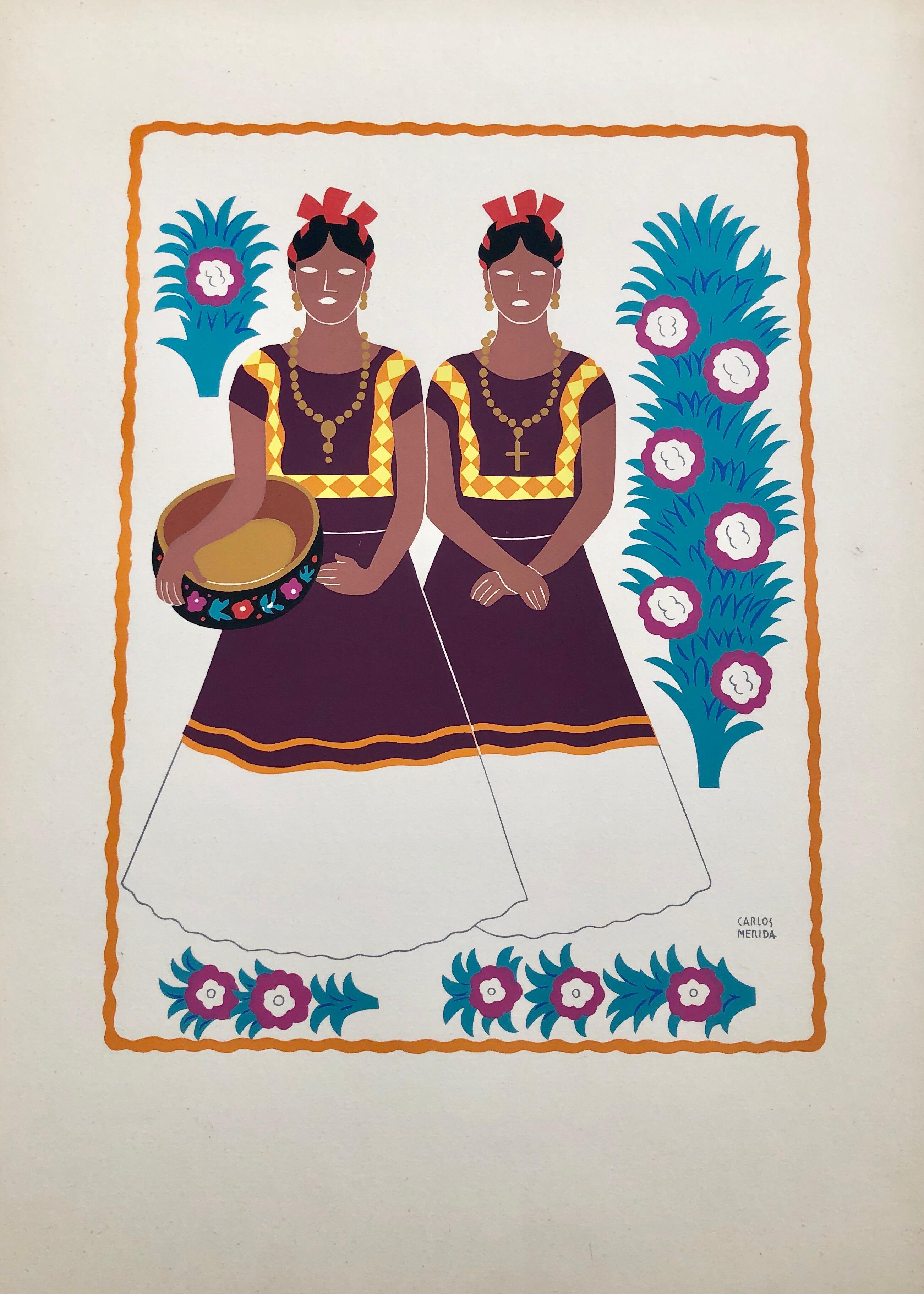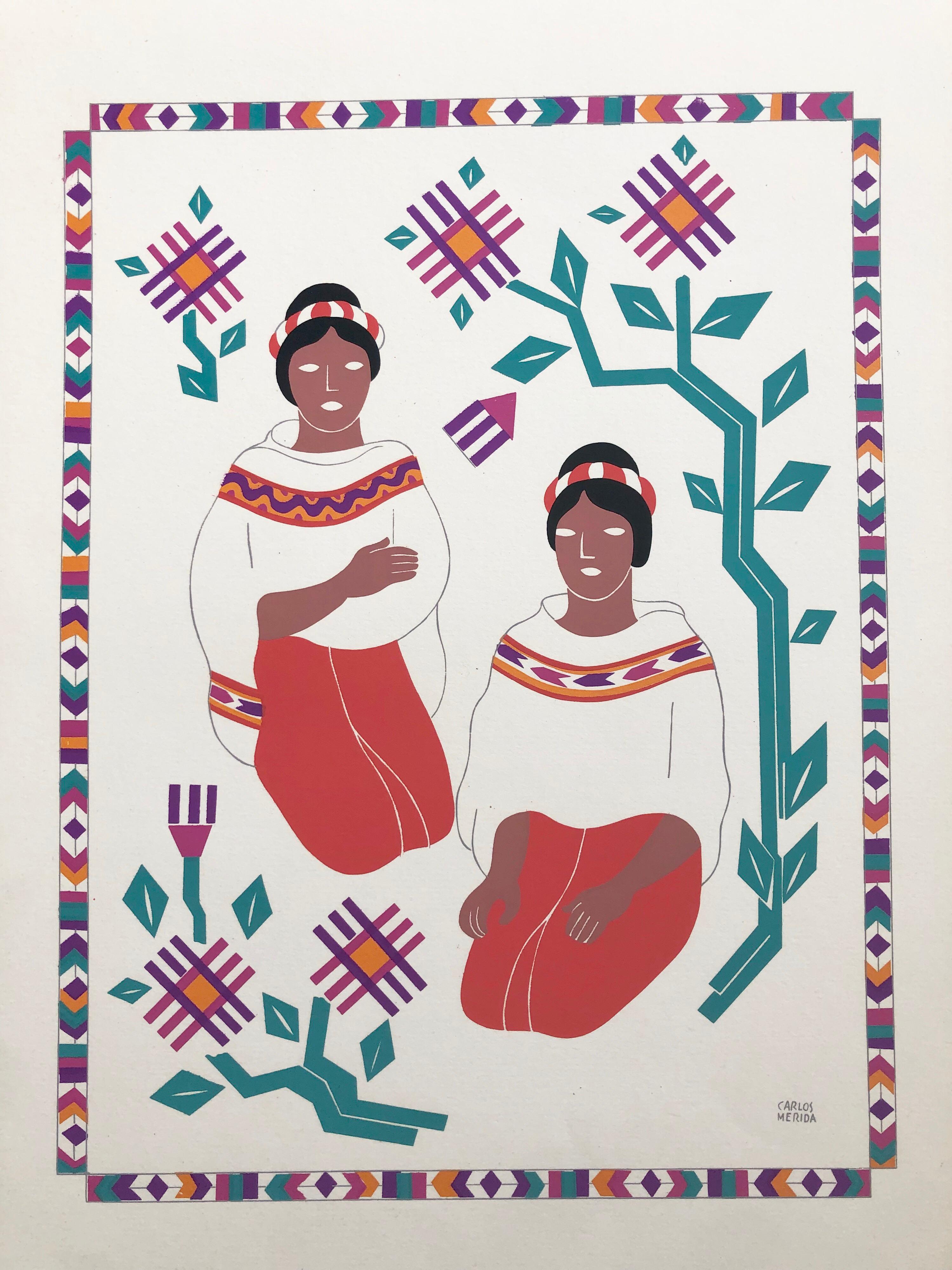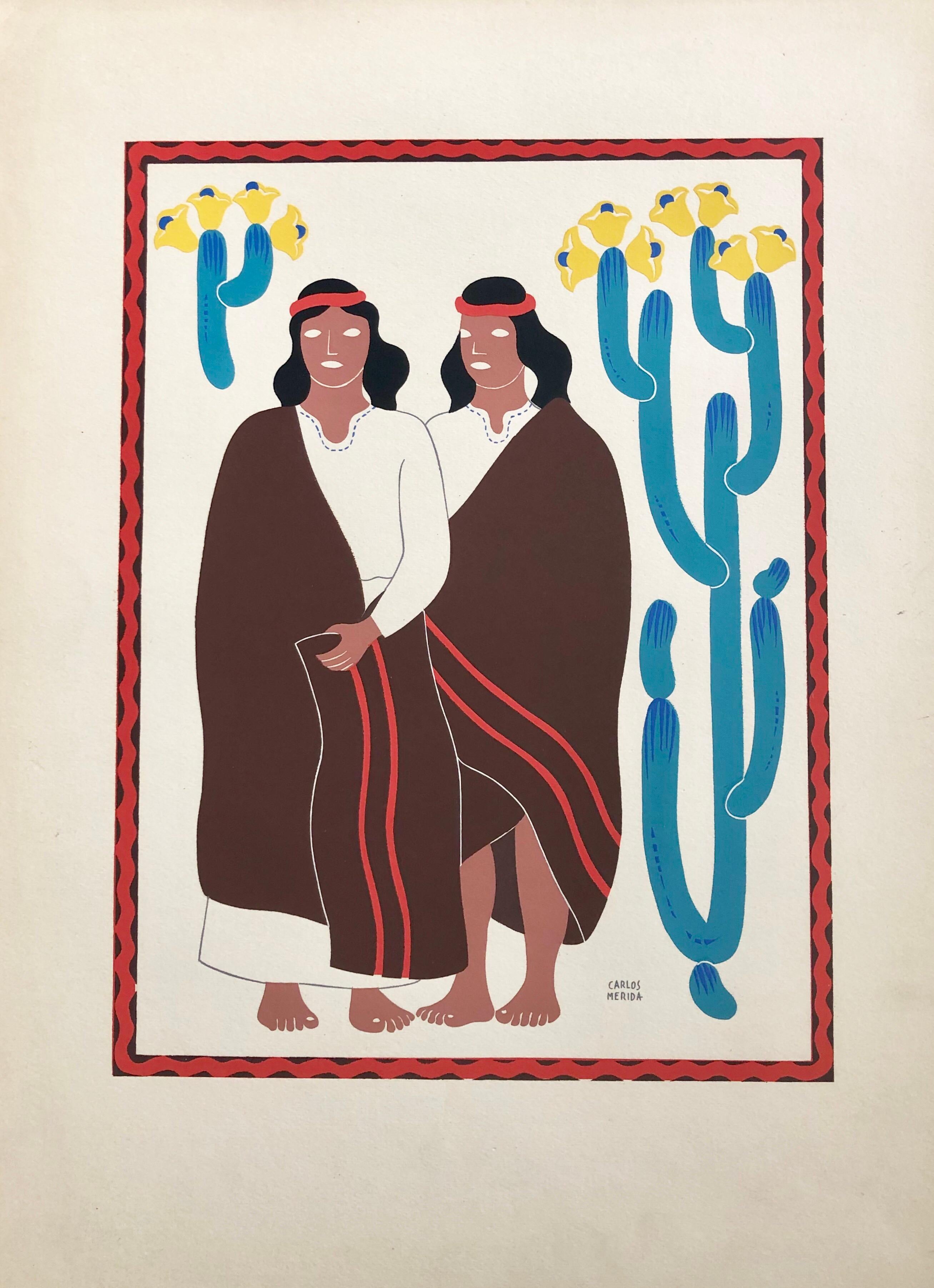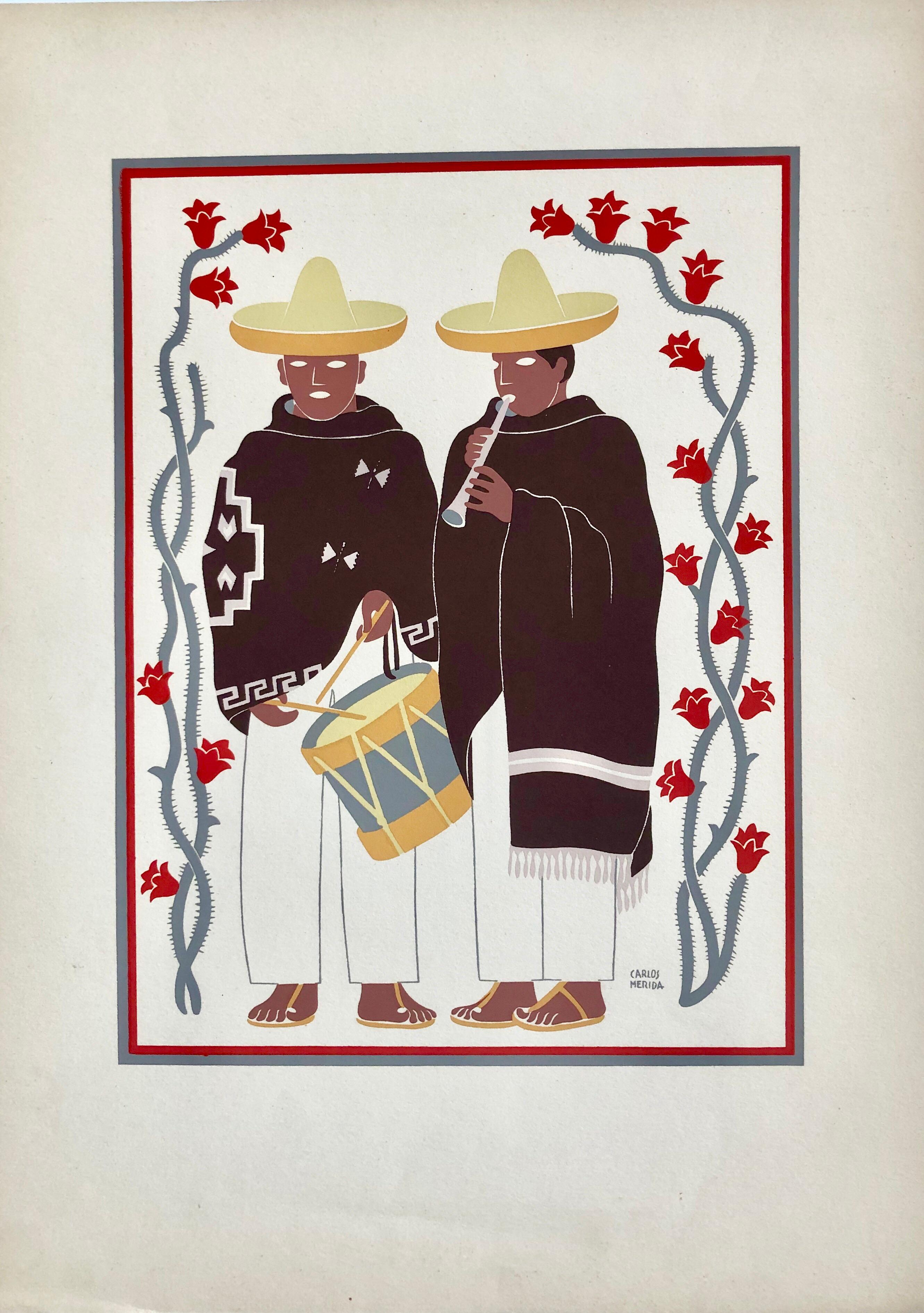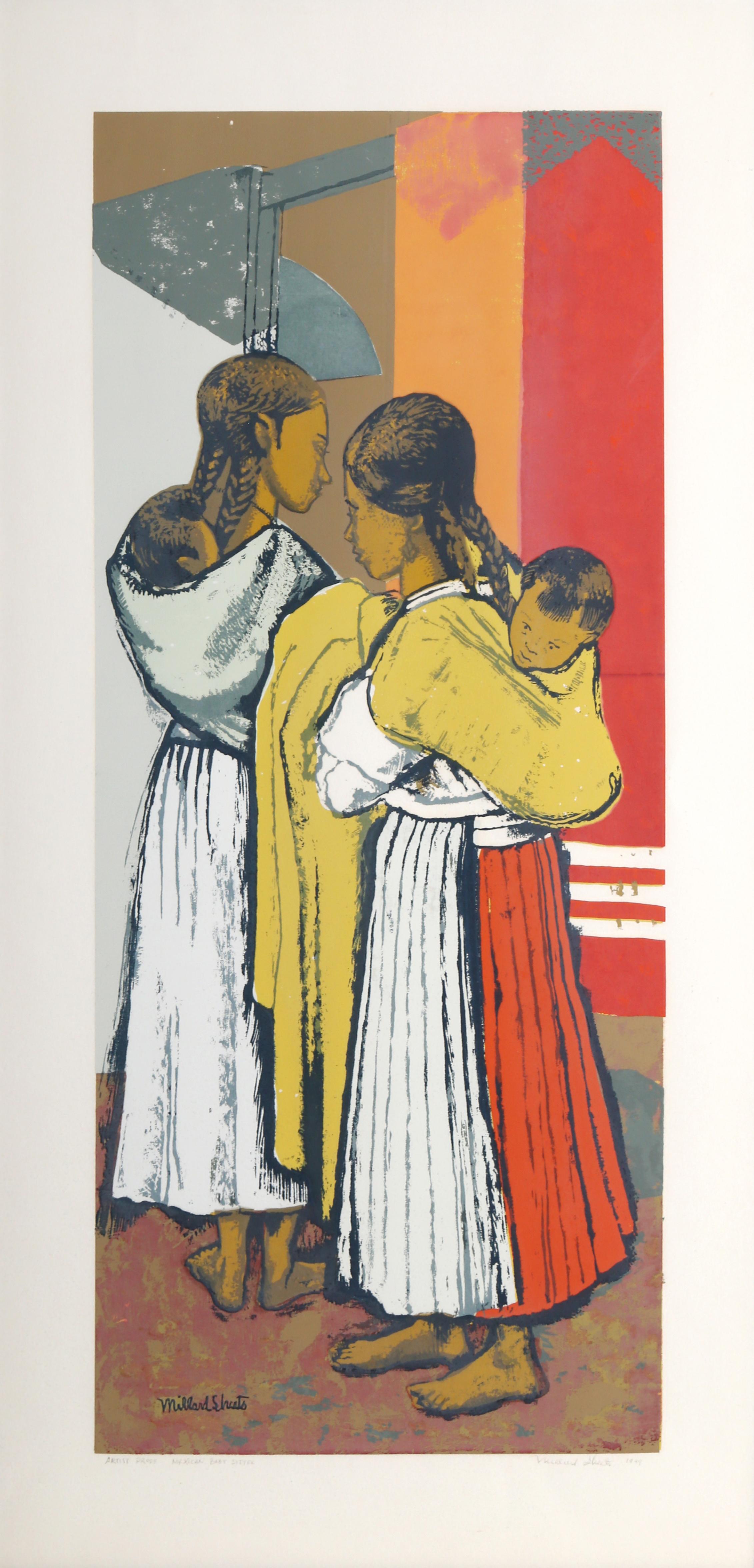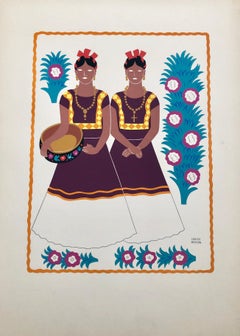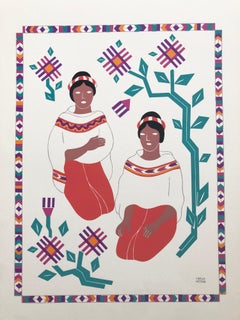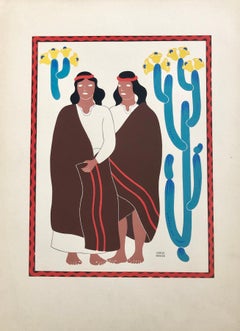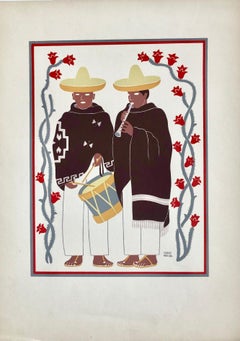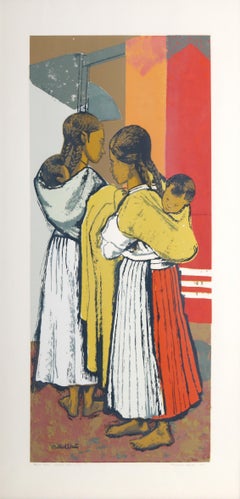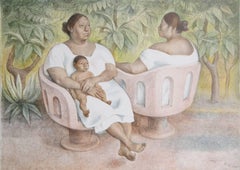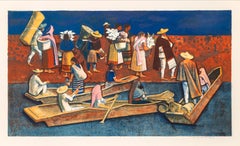Items Similar to 1945 Mexican Modernist Silkscreen Serigraph Print Regional Folk Art Dress Mexico
Want more images or videos?
Request additional images or videos from the seller
1 of 10
Carlos Merida1945 Mexican Modernist Silkscreen Serigraph Print Regional Folk Art Dress Mexico1945
1945
$950
£720.51
€827.54
CA$1,361.01
A$1,498.37
CHF 765.82
MX$17,883.42
NOK 9,750.51
SEK 9,124.30
DKK 6,181.24
About the Item
This listing is for the one Silkscreen serigraph piece listed here.
Mexico City, 1945. First edition. plate signed, limited edition of 1000, these serigraph plates depict various types of traditional and folk art indigenous clothing and costume styles from around Mexico. The illustrations depict the cultures of many different states in Mexico, including Oaxaca, Chiapas, Jalisco and Veracruz.
Carlos Mérida (December 2, 1891 – December 21, 1985) was a Guatemalan artist who was one of the first to fuse European modern painting to Latin American themes, especially those related to Guatemala and Mexico. He was part of the Mexican muralism movement in subject matter but less so in style, favoring a non-figurative and later geometric style rather than a figurative, narrative style. Mérida is best known for canvas and mural work, the latter including elements such as glass and ceramic mosaic on major constructions in the 1950s and 1960s. One of his major works, on the Benito Juarez housing complex, was completely destroyed with the 1985 Mexico City earthquake, but a monument to it exists at another complex in the south of the city.
Carlos Mérida was born Carlos Santiago Ortega in Guatemala City to Serapio Santiago Mérida and Guadalupe Ortega Barnoya. He later changed his name what is known by as he thought it was more sonorous. His brothers and children also took the Mérida name later on. He was of mixed Spanish/Maya-Quiché heritage which he promoted during his life.
As a young child, Mérida had both music and art lessons, and his first passion was music, which led to piano lessons. He studied at a trade school called the Instituto de Artes y Oficios, then the Instituto de Ciencias y Letras. Here he began to have a reputation for the avant garde.
Merída’s first trip to the United States was in 1917, where he met writer Juan José Tablada. Mérida made several trips to Europe over his lifetime to both study art and work as an artist and diplomat. His early trips in the 1920s and 1930s put him in touch with both avant garde movements in Europe as well as noted Latin American artists, especially those from Mexico. His last trip was in 1950s.
In 1963, he donated canvases, graphic pieces and mural sketches to the Universidad Nacional Autónoma de Mexico. Merida was one of a number of artists such as Diego Rivera and Gerardo Murillo who became committed to promoting the handcrafts and folk art of Mexico and Central America, with a particular interest in those of Guatemala, often featuring Mayan textiles or elements in their decoration in his artwork. He died in Mexico City at the age of 94 on December 21, 1985.
As there was little opportunity for artists in Guatemala, in 1910, Mérida traveled to Paris with a friend named Carlos Valenti on a German cargo ship. From then until 1914, he lived and worked in Paris and traveled much of Europe. This put him in touch with European avant garde artists such as Van Dagen, Amedeo Modigliani, Pablo Picasso and Piet Mondrian as well as Latin American artists studying in Europe such as Diego Rivera, Jorge Enciso, Ángel Zárraga and Dr. Atl. He exhibited his work in venues such as the Independent Salon and the Giroux Gallery in Paris.
Mérida has forty five exhibitions in the United States and eighteen in Mexico from 1928 to 1948. These included an exhibition with Rufino Tamayo at the Art Center of New York (1930), the John Becker and Valentine galleries in New York (1930), the Club de Escritores de México and the Galería Posada in Mexico City (1931), the Stendhal Gallery and the Stanley Rose Gallery in Los Angeles, the East West Gallery in San Francisco, the Palacio de Bellas Artes and the Georgette Passedoit and Cuchnitz galleries in New York (1939-1940) as well as the International Surrealist Exhibition in 1940 in Mexico City. He worked intensely in the 1950s, 1960s and 1970s producing designs, graphic works, scenographic sketches for dance, and tapestries, playing with geometric variants. Other venues for his exhibitions included Harvard University, the Berkeley Art Museum at the University of California in Berkeley, the Metropolitan Museum of Art and the Museum of Fine Arts, Boston. In 1954 he exhibited at the Museo de Bellas Artes in Caracas.
Mérida’s early monumental work was related to Mexican muralism, one reason he relocated to Mexico at the end of the Mexican Revolution. There he joined a group called the Renacimiento Mexicano (Mexican Renaissance) and then worked with Diego Rivera as an assistant at the Bolivar Amphitheater (San Ildefonso College) along with Jean Charlot, Amado de la Cueva, and Xavier Guerrero.
In addition to painting on canvas and glass mosaic murals, Mérida also worked in education. In 1932, he founded the dance school of the Secretariat of Public Education with Carlos Orozco Romero and invited the participation of other artists such as Agustín Lazo, Leopoldo Méndez, Silvestre Revueltas and Blas Galindo. He ran the school for three years working with dancers such as Gloria and Nellie Campobello, Graciela Arriaga, Anna Sokolow, Waldeen, Gloria Contreras, Evelia Beristain, Rosa Rayna and his own daughter Ana Mérida. This interest in dance led him to design stage set and costumes for twenty two works from 1940 to 1979.
His early work is marked by experimentation. He was in Europe when the avant garde was transitioning from Impressionism to Cubism and he was influenced by the works of Modigliani and Picasso. His surrealist phase again came from time in Europe, meeting not only Paul Klee and Joan Miró but also fellow Guatemalan Luis Cardoza y Aragón. Luis Cardoza y Aragon called him a pioneer of Latin American art, painting elements such as indigenous people, Mexican and Central American landscapes without oversentimenalizing which had not been done before. This emphasis on the New World not only was expressed with folkloric images, especially in his early work, but also in his later work. The discovery of Bonampak motivated him deeply, taking new ideas from the ruins and eventually led to his interest in integrating painting and sculpture into architecture.
About the Seller
4.9
Platinum Seller
Premium sellers with a 4.7+ rating and 24-hour response times
Established in 1995
1stDibs seller since 2014
1,818 sales on 1stDibs
Typical response time: 1 hour
- ShippingRetrieving quote...Shipping from: Surfside, FL
- Return Policy
Authenticity Guarantee
In the unlikely event there’s an issue with an item’s authenticity, contact us within 1 year for a full refund. DetailsMoney-Back Guarantee
If your item is not as described, is damaged in transit, or does not arrive, contact us within 7 days for a full refund. Details24-Hour Cancellation
You have a 24-hour grace period in which to reconsider your purchase, with no questions asked.Vetted Professional Sellers
Our world-class sellers must adhere to strict standards for service and quality, maintaining the integrity of our listings.Price-Match Guarantee
If you find that a seller listed the same item for a lower price elsewhere, we’ll match it.Trusted Global Delivery
Our best-in-class carrier network provides specialized shipping options worldwide, including custom delivery.More From This Seller
View All1945 Mexican Modernist Silkscreen Serigraph Print Regional Folk Art Dress Mexico
Located in Surfside, FL
This listing is for the one Silkscreen serigraph piece listed here.
Mexico City, 1945. First edition. plate signed, limited edition of 1000, these serigraph plates depict various types of traditional and folk art indigenous clothing...
Category
1940s Folk Art Figurative Prints
Materials
Screen
1945 Mexican Modernist Silkscreen Serigraph Print Regional Dress Carlos Merida
Located in Surfside, FL
This listing is for the one Silkscreen serigraph piece listed here.
Mexico City, 1945. First edition. plate signed, limited edition of 1000, these serigraph plates depict various types of traditional and folk art indigenous clothing...
Category
1940s Folk Art Figurative Prints
Materials
Screen
1945 Mexican Modernist Silkscreen Serigraph Print Regional Folk Art Dress Mexico
Located in Surfside, FL
This listing is for the one Silkscreen serigraph piece listed here.
Mexico City, 1945. First edition. plate signed, limited edition of 1000, these serigraph plates depict various types of traditional and folk art indigenous clothing...
Category
1940s Folk Art Figurative Prints
Materials
Screen
1945 Mexican Modernist Silkscreen Serigraph Print Regional Folk Art Dress Mexico
Located in Surfside, FL
This listing is for the one Silkscreen serigraph piece listed here.
Mexico City, 1945. First edition. plate signed, limited edition of 1000, these serigraph plates depict various types of traditional and folk art indigenous clothing...
Category
1940s Folk Art Abstract Prints
Materials
Screen
Shalako Dancer, Native American Indian Lithograph California Woman Artist
By Alice Asmar
Located in Surfside, FL
American contemporary artist of Lebanese and Greek descent, Alice Asmar's art is often inspired by her love of nature, combined with a deep respect for native American culture, her work evolved into Southwestern themes of Indian Ceremonial Dance-Dramas, Indian portraits and landscapes.In 1991, Alice Asmar was chosen for prestigious Honorary Membership in the
National League of American Pen Women. Only three such honors are given each year. This recognition reaches back to her childhood, Alice Asmar was considered a child prodigy, winning awards and recognition for her artwork before the age of 10.
Her education from 1946 through 1959 included a BA magna cum laude, from Lewis and Clark College, Portland; an MFA from the University of Washington, Seattle; and a one-year fellowship to study at L'Ecole Nationale Superieure des Beaux-Arts, Paris, France. Born in Flint, Michigan of Lebanese and Greek descent. Her parents moved to Portland, Oregon when she was just a baby. The artwork of her early years was inspired by the splendors of nature, from the inscrutable pines and ancient sculptured rocks along the Oregon Coast to the mysterious ocean mists.
She Graduated magna cum laude from Lewis and Clark College in Portland and Obtained her Master's of Fine Arts Degree at The University of Washington in Seattle. Soon after graduating she accepted a job as an engineering drafter at Boeing Aircraft in Seattle. Her Assignment was clearing top secret drawing for air-to-ground missile. Alice worked for Boeing for less than a year. They offered her an engineering scholarship but she decided to go back to the art she loved doing from she was a child. After studying and traveling throughout the Near East, France, Switzerland, Italy, Yugoslavia, Turkey, The Greek Islands, Greece and Lebanon, Asmar set up studios in California, New Mexico and Oregon. A master of many media, Asmar is distinguished for her many techniques which include paintings in Oil, casein and Acrylic, drawing in ink, pencil and pastel, collage, tapestry, books,American contemporary artist of Lebanese and Greek descent, Alice Asmar's art is often inspired by her love of nature, combined with a deep respect for native American culture, her work evolved into Southwestern themes of Indian Ceremonial Dance-Dramas, Indian portraits and landscapes. Prints including lithography, etching, Engraving on metal on plexiglas, portraits, murals and banners. Her hand engraving of innovative designs for dinner and household wares for Nambe Mills in Santa Fe is recognized internationally.
Alice Asmar's works are in several hundred public and private collections in the United States and Europe, including the Smithsonian Institution, Franklin Mint, Portland Art Museum, Gene Autry Hotel in Palm Springs, Security Pacific International Bank of New York, The Public Art Museum of Gabrova, Bulgaria, kaiser-Permanente, and the Dr. Nicholas Townell collection in Angus, Scotland.
Studied with Edward Melcarth & Archipenko, University of Washington, MFA.
Work: National Museum of American History Smithsonian Institute, Washington. Los Angeles City-Scape at sunset (Mural), Commissioned by Dr. Walter jayasinghe, 66; Painting of doves, Bangs Manufacturing Co, Burbank
Exhibitions: Seattle Art Museum. Museum of Science & Industry, Los Angeles.
Circle Gallery Ltd, Houston, Abbot Hall Gallery, William Temple House, Portland Oregon. Nambe Mills, Santa Fe, New Mexico. Sr Eye Art Gallery, Long Beach. Descanso Gardens, La Canada Flintridge, California.Sun Cities Art Museum, Arizona. Audubon Art Exhibit, Portland Oregon.Walt Disney Art...
Category
1980s Contemporary Figurative Prints
Materials
Lithograph
Rainbow Dancer, Native American Indian Lithograph California Woman Artist
By Alice Asmar
Located in Surfside, FL
American contemporary artist of Lebanese and Greek descent, Alice Asmar's art is often inspired by her love of nature, combined with a deep respect for native American culture, her work evolved into Southwestern themes of Indian Ceremonial Dance-Dramas, Indian portraits and landscapes.In 1991, Alice Asmar was chosen for prestigious Honorary Membership in the
National League of American Pen Women. Only three such honors are given each year. This recognition reaches back to her childhood, Alice Asmar was considered a child prodigy, winning awards and recognition for her artwork before the age of 10.
Her education from 1946 through 1959 included a BA magna cum laude, from Lewis and Clark College, Portland; an MFA from the University of Washington, Seattle; and a one-year fellowship to study at L'Ecole Nationale Superieure des Beaux-Arts, Paris, France. Born in Flint, Michigan of Lebanese and Greek descent. Her parents moved to Portland, Oregon when she was just a baby. The artwork of her early years was inspired by the splendors of nature, from the inscrutable pines and ancient sculptured rocks along the Oregon Coast to the mysterious ocean mists.
She Graduated magna cum laude from Lewis and Clark College in Portland and Obtained her Master's of Fine Arts Degree at The University of Washington in Seattle. Soon after graduating she accepted a job as an engineering drafter at Boeing Aircraft in Seattle. Her Assignment was clearing top secret drawing for air-to-ground missile. Alice worked for Boeing for less than a year. They offered her an engineering scholarship but she decided to go back to the art she loved doing from she was a child. After studying and traveling throughout the Near East, France, Switzerland, Italy, Yugoslavia, Turkey, The Greek Islands, Greece and Lebanon, Asmar set up studios in California, New Mexico and Oregon. A master of many media, Asmar is distinguished for her many techniques which include paintings in Oil, casein and Acrylic, drawing in ink, pencil and pastel, collage, tapestry, books,American contemporary artist of Lebanese and Greek descent, Alice Asmar's art is often inspired by her love of nature, combined with a deep respect for native American culture, her work evolved into Southwestern themes of Indian Ceremonial Dance-Dramas, Indian portraits and landscapes. Prints including lithography, etching, Engraving on metal on plexiglas, portraits, murals and banners. Her hand engraving of innovative designs for dinner and household wares for Nambe Mills in Santa Fe is recognized internationally.
Alice Asmar's works are in several hundred public and private collections in the United States and Europe, including the Smithsonian Institution, Franklin Mint, Portland Art Museum, Gene Autry Hotel in Palm Springs, Security Pacific International Bank of New York, The Public Art Museum of Gabrova, Bulgaria, kaiser-Permanente, and the Dr. Nicholas Townell collection in Angus, Scotland.
Studied with Edward Melcarth & Archipenko, University of Washington, MFA.
Work: National Museum of American History Smithsonian Institute, Washington. Los Angeles City-Scape at sunset (Mural), Commissioned by Dr. Walter jayasinghe, 66; Painting of doves, Bangs Manufacturing Co, Burbank
Exhibitions: Seattle Art Museum. Museum of Science & Industry, Los Angeles.
Circle Gallery Ltd, Houston, Abbot Hall Gallery, William Temple House, Portland Oregon. Nambe Mills, Santa Fe, New Mexico. Sr Eye Art Gallery, Long Beach. Descanso Gardens, La Canada Flintridge, California.Sun Cities Art Museum, Arizona. Audubon Art Exhibit, Portland Oregon.Walt Disney Art...
Category
1980s Contemporary Figurative Prints
Materials
Lithograph
You May Also Like
Mexican Babysitter, Folk Art Screenprint by Millard Sheets 1949
By Millard Sheets
Located in Long Island City, NY
Mexican Babysitter
Millard Owen Sheets, American (1907–1989)
Screenprint, signed and numbered in pencil
Edition of AP
Image Size: 24 x 11 inches
Category
1940s American Modern Figurative Prints
Materials
Lithograph
Ameyaltepec, Guerrero. Tempera on paper. Venancio, Eugenio. Mexico, 20th c
Located in Madrid, ES
Ameyaltepec, Guerrero. Tempera on paper. Venancio, Eugenio. Mexico, 20th century.
Naïve rural landscape titled in the lower right and signed in the lower left, with people, building...
Category
20th Century Mexican Other Paintings
Materials
Paper
Yucatecas en la Parque, Folk Art Lithograph by Francisco Zuniga
By Francisco Zúñiga
Located in Long Island City, NY
Artist: Francisco Zuniga, Mexican (1912 - 1998)
Title: Yucatecas en la Parque
Year: 1986
Medium: Lithograph, signed and numbered in pencil
Edition: 150
Size: 21 in. x 30 in. (5...
Category
1980s Expressionist Figurative Prints
Materials
Lithograph
Mexican Travelers, Modern Lithograph by Millard Sheets
By Millard Sheets
Located in Long Island City, NY
Mexican Travelers by Millard Owen Sheets, American (1907–1989)
Date: Circa 1977
Lithograph on Arches paper, signed and numbered in pencil
Edition o...
Category
1970s American Modern Landscape Prints
Materials
Lithograph
Circa 1960 original poster for Mexico pride of indian culture
Located in PARIS, FR
This circa 1960 original poster, issued by the Dirección General de Turismo, is a bold and vivid celebration of Mexico’s indigenous heritage, titled “Mexico – Pride of Indian Culture...
Category
1960s Prints and Multiples
Materials
Paper, Lithograph
Original Chiapas, Mexicana Airlines Poster by Regina Raull
Located in Mexico City, CDMX
circa 1970. We offer this Original Chiapas, Mexicana Airlines Poster by Regina Raull.
Regina Raull was a Spanish painter with residence in Mexico Ci...
Category
Vintage 1970s Mexican Mid-Century Modern Posters
Materials
Paper
More Ways To Browse
Vintage Mexican Plates
Folk Costume
Mexican Jalisco
San Ildefonso
Vintage Guatemalan Textiles
Dr Atl
Carlos Merida Silkscreens
1960s Womens Fashion
Alaska Watercolor
Albrecht Durer Woodcut Print
Alex Katz Dancer 2
Alice Neel Lithograph
Anders Zorn Etchings
Andy Warhol Dollar Sign
Andy Warhol Electric Chair Art
Antique Lawyer Prints
Arnold Friberg
Atoms For Peace
